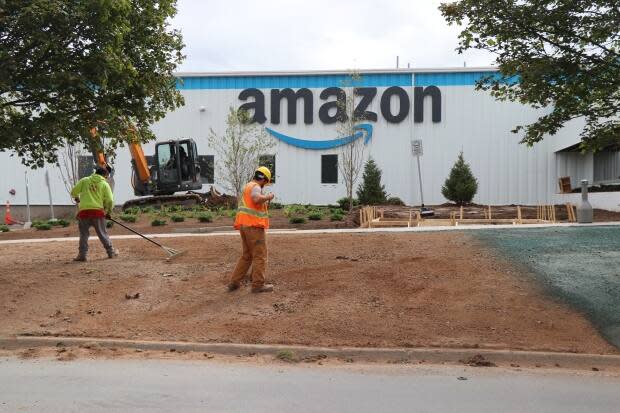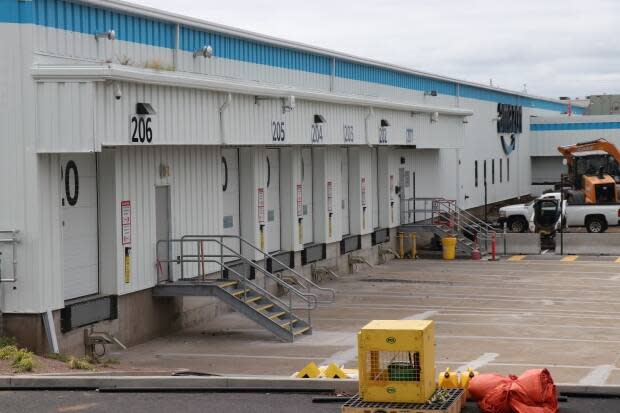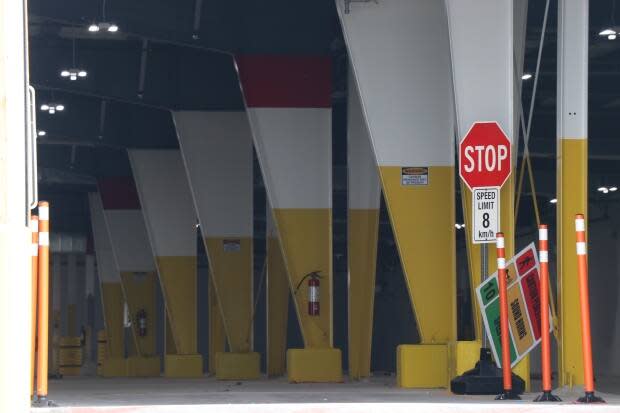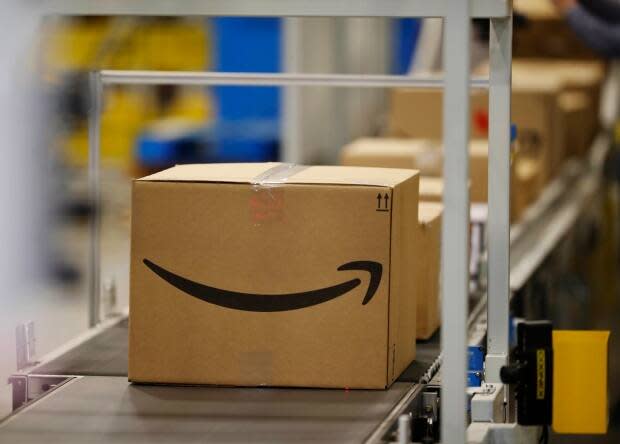Amazon's Dartmouth warehouse is hiring, but advocate worries for delivery drivers

Amazon has been advertising to hire full-time employees for a new warehouse it's expected to soon open in Dartmouth, N.S., but a labour advocate is concerned that the delivery of packages will still be left to subcontracted workers he says are exploited by the e-commerce giant.
The company, which bought the site earlier this year in the Burnside industrial park, hasn't publicly commented on its plans, but has been posting jobs at the package sorting facility, known as a "delivery station."
"When we hear an announcement of something like a delivery station … the first question that we're wondering is: 'Who's going to be doing the deliveries?'" said Aaron Spires, a national union representative with Canadian Union of Postal Workers (CUPW). "Often it ends up being delivery service providers that pay piecemeal."
Amazon, which is not unionized in Canada, often uses what it calls delivery partners, or contractors in other words, to make deliveries, a common business model used by companies such as Uber and DoorDash. Known as gig work, it is often temporary in nature.
The most recent data from Statistics Canada indicated the median net income of gig work in 2016 was just $4,300. The study also found that gig work was more prevalent among immigrants than Canadian-born people. Nearly 11 per cent of male immigrant workers who had been in Canada for less than five years were gig workers in 2016, compared with 6.1 per cent of male Canadian-born workers.

Lars Osberg, a professor of economics at Dalhousie University, said it is not uncommon for large companies such as Amazon or Uber to use this subcontracting business model, and there has been a recent uptick.
"There's been a big trend in the gig economy, not just delivery of packages, but also delivery of people through, like, Uber and to try to get people to work on a per trip or a per person or per item basis, rather than to recognize that employees need an hourly wage," said Osberg.
Amazon has not responded to CBC's request for comment.
Amazon classifies its drivers as subcontractors or freelancers, which Spires said is something Gig Workers United, a group supported by CUPW, is trying to change. By using subcontractors, he said, Amazon is able to absolve itself of any responsibility when it comes to paying fair wages to drivers.
"What we're hearing from folks in Nova Scotia as well as other places is that what we need to fix is that misclassification," said Spires. "We know that the pandemic has laid bare, that online shopping is spiking across the country… But you know, that spike in online ordering and the cheap goods that we're receiving shouldn't come on the backs of the workers delivering there."

Osberg said by not recognizing drivers as employees, Amazon is essentially able to avoid paying into things like benefits, the Canada Pension Plan and employment insurance.
"Amazon, in particular, is a very profitable company, and getting them [drivers] to do more for less is in the interests of the owner of the company," he said. "It's not in the interests of the workers."
In Canada, one of Amazons primarily "delivery service partners" is called Intelcom. Those delivering through Intelcom for Amazon are paid between $1.25 to $1.35 per package, as opposed to an hourly wage. They are also expected to be responsible for any lost parcels, use their own vehicles, and pay for gas and vehicle maintenance.
Full-time hires
The new Amazon location Dartmouth touts pay of around $17.60 per hour for full-time workers on site. Most of the new entry level shifts will be from 1 a.m. to 11 a.m., four days a week, according to a recent virtual hiring event reported by news organization Huddle Today.
"I was recently talking with a worker that got hired on that exact shift at a delivery station in Montreal, and he has two small children," said Spires. "[It's] incredibly difficult to manage child care with his partner and incredibly difficult to get to work because obviously starting at, like, 1 a.m. is highly impractical for transit in most places."
Spires said not only are these kinds of shifts impractical, but they are dangerous too — something that has been known for a long time.
"People who do this work have a higher risk of breast cancer, elevated risks of other cancers… There's an increased risk of heart disease for people that work the night shift. There's an increased risk of workplace injury."

As for gig workers, Spire said there's been rising concerns over a controversial measure recently passed in California called Proposition 22. It exempts gig companies like Uber and Instacart from needing to classify their workers as employees and pay into benefits like workers' compensation and health insurance.
Spires said provincial governments are being lobbied by Uber to create something similar in Canada.
In 2020, an Ontario Labour Relations Board ruled that couriers with the food-delivery company Foodora had the right to unionize, after the employees voted the previous August on whether to join CUPW. Foodora, which had fought the union push, subsequently closed its Canadian operations, saying it wasn't making enough money.
Spires said Gig Workers United and CUPW has been in contact with Nova Scotia delivery drivers for Amazon, including those who work with Intelcom.
"If the employers are going to put forward a kind of a spurious argument that the workers are independent contractors, we're going to challenge that by getting workers together to push back... with the ultimate goal of unionizing and bargaining collectively."
MORE TOP STORIES

 Yahoo Movies
Yahoo Movies 